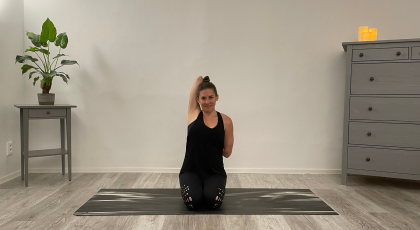View basket (0 items $0.00)

Irritable Bowel Syndrome and Yoga
As I am preparing for my upcoming web talks on Yoga for Healthy Digestion for YogaU Online, I am rediscovering a lot about both our digestive health and illness. Of particular interest is a very common gastro-intestinal (GI) condition called Irritable Bowel Syndrome, sometimes abbreviated IBS. The last time statistics were taken for this condition in the US, it was estimated that 15.3 million people suffered with IBS. It accounted for three million doctor’s office visits in 2004, 212,000 hospitalizations the same year, and 5.9 million prescriptions. Before we look at yoga’s potential impact on IBS, let’s take a look at how IBS shows up and what we know about its causes. According to the Mayo Clinic website:
“Irritable bowel syndrome (IBS) is a common disorder that affects your large intestine (colon). Irritable bowel syndrome commonly causes cramping, abdominal pain, bloating gas, diarrhea and constipation. Despite these uncomfortable signs and symptoms, IBS doesn't cause permanent damage to your colon.”
For most students and patients of mine with IBS, it is a chronic condition that they have had since childhood or teenage years that fluctuates from day to day, week to week or month to month. I want to bring special attention that last comment in the quote: IBS does not cause permanent damage to your colon. This in contrast to the less common but more serious GI conditions like Crohn’s disease and other inflammatory bowel diseases that do damage the gut and can have life-threatening consequences. Maybe because IBS does not have such serious consequences, some health care professionals may minimize the impact of IBS. But those who suffer from it know it can be a source of daily discomfort and challenge.
Another aside: since the recent recognition of Celiac disease, gluten allergy and sensitivity and the ability to test for them, many patients previously with an IBS diagnosis have been found to actually be gluten allergic, or have Celiac Disease. This has resulted in a huge improvement in symptoms for these folks as they eliminate gluten-containing foods from their diets. So, if you have been told you have IBS and have not been tested for gluten, do so soon. Also, know that there are newer and more sensitive tests for Gluten allergy, and to learn more, listen to this KPFA broadcast. The discussion is on Lyme disease, but gluten allergy/Celiac testing is also addressed at the start of the program from minute 8 through 22.
It is unclear what the cause of IBS is, but it may have something to do with the smooth muscle lining of the gut walls that helps to move digesting food downstream. In some people the wave of contractions may be too fast or too slow. It may also be that the neurotransmitter serotonin may play a role in IBS, as a lot of it is found in the gut. The balance of gut bacteria may also be off in IBS. Triggers for IBS are varied and variable from person to person, and include gas or pressure on your intestines, or certain foods, medications or emotions. Hormone fluctuations, especially female ones (IBS is more common in women than men) and stress are also common triggers.
The risk factors for IBS include age of onset before 35, being a woman, and having a first degree relative with IBS.
The yoga approach to IBS is similar to some of the posts where we have discussed healthy digestion and eating (see Healthy Eating and Your Digestive System, Meditation and Healthy Eating, and other posts under the label "healthy eating").
-
If you think you may have food triggers, the increased awareness of your body and its reactions to foods you eat that develops with regular yoga practice can help you identify and eliminate your personal food triggers.
-
In my practice, I noticed that flares of symptoms are very often related to increased periods of stress in my students’ lives. The effective stress reducing benefits of yoga, either via a well balanced yoga asana practice, or a more focused restorative practice, yoga nidra or simple mindful meditation practices could all help bring your gut into better balance and reduce your symptoms. (See The Relaxation Response and Yoga.)
-
For a sluggish gut, with bloating and constipation, try Supta Baddha Konasana (Reclined Cobbler’s pose or Queen’s pose), and for an overactive gut with cramping and tendency for diarrhea, try Viparita Karani (Legs Up the Wall pose).
-
If you have not taken the “tour of your GI tract” we posted a while back, you could use it as a guided meditation while setting yourself up in a supported Savasana (see the Audio Tracks tab at the top of the page to find this audio track).
And if you want to learn more about Yoga for Healthy Digestion, check out my two-part course on YogaUOnline - see here.
 Baxter Bell, MD began his healing work as a Family Physician in 1989, followed by more than 11 years of full time private practice in the Cincinnati, Ohio area. Since relocating to the Bay Area in 2000, his work has evolved to incorporate his vision of a more holistic style of healing. He currently maintains a part-time Complementary Medical practice in Oakland, which emphasizes Medical Acupuncture and Therapeutic Yoga. Yoga Asana and Pranayama are therapeutically integrated into treatment plans for many of his patients.
Baxter Bell, MD began his healing work as a Family Physician in 1989, followed by more than 11 years of full time private practice in the Cincinnati, Ohio area. Since relocating to the Bay Area in 2000, his work has evolved to incorporate his vision of a more holistic style of healing. He currently maintains a part-time Complementary Medical practice in Oakland, which emphasizes Medical Acupuncture and Therapeutic Yoga. Yoga Asana and Pranayama are therapeutically integrated into treatment plans for many of his patients.
Featured Courses








